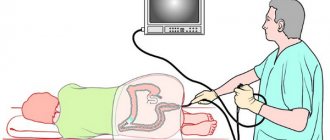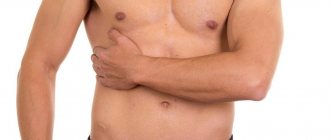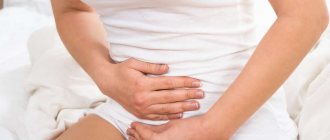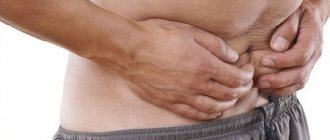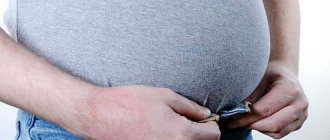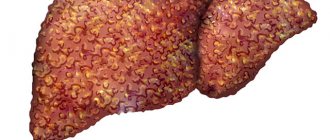Tingling and discomfort in the lower abdomen is a common symptom, characteristic of both women and men. This phenomenon may indicate a variety of diseases of the intestines or urinary system. In women, tingling in the abdomen may indicate natural processes such as menstruation or pregnancy.
If severe pain is added to these sensations, you should immediately seek medical help. What can a doctor discover when examining a patient with such symptoms? Let's look at the most common causes of tingling in the lower abdomen.
One of the common causes of tingling in the lower abdomen is appendicitis. It can occur in both women and men. Another common cause is an ectopic or normal pregnancy. Another common cause is intestinal problems, such as Crohn's disease.
In addition to Crohn's disease, the intestines can signal possible diverticula and tumors. Inflammation of the appendages may also accompany tingling in the abdomen. Let's talk about each problem in more detail. Let's start with appendicitis.
Acute appendicitis
Common causes of sensations such as tingling in the lower abdomen and acute pain are appendicitis. The pain in this disease is severe. Localization of pain is predominantly on the right. In acute appendicitis, discomfort in the lower abdomen is replaced by sharp pain. The person may experience attacks of nausea and vomiting. An increase in temperature is also possible. Sometimes the patient experiences diarrhea.
An acute form of appendicitis in a patient requires urgent surgical intervention - removal of a small branch of the cecum. If this is not done in time, dangerous consequences are possible, such as intestinal gangrene and subsequent peritonitis.
How to get examined
Abdominal discomfort is not a basis for making an accurate diagnosis. The patient needs to undergo certain types of examination that will allow the doctor to determine the causes of pain in the stomach and prescribe the necessary treatment to eliminate this symptom.
Diagnostic measures include:
- Anamnesis collection. The doctor finds out where the discomfort is located in the abdomen, the nature of the pain and the accompanying symptoms. It is important to find out whether the discomfort is related to food intake.
- Ultrasound of the gastrointestinal tract. Ultrasound scanning of organs that are directly involved in digestion can detect pathology. Changes in the structure of organ tissues are studied, various neoplasms that can cause pain are identified.
- Gastroduodenography. A probe equipped with a camera is inserted into the patient’s digestive organs, which allows for a thorough examination of the digestive organ and identification of pathology.
- CT scan. It is carried out for a more detailed study if difficulties arise in diagnosis, as well as for differentiation with other diseases.
If you have stabbing pain in the stomach, the answer to the question of what to do should be sought at an appointment with a gastroenterologist. Treatment is aimed not only at eliminating this symptom, but also at eliminating its cause. If you limit yourself to taking antispasmodics without visiting a medical facility to find out the causes of this symptom, the patient risks significantly deteriorating his health.
Pathologies of pregnancy
Unlike men, tingling in the lower abdomen for women is a characteristic symptom of the first trimester of pregnancy. However, during a normal pregnancy, a woman may feel a slight tingling sensation on the right side. If there is a serious pathology, the tingling in the abdomen is sharp and sometimes acute.
In many cases, tingling in the abdomen signals an ectopic pregnancy. This problem appears if the fetus begins to develop in the fallopian tube or abdominal cavity. The dangers of such a pregnancy are damage to the uterine tubes, serious blood loss and subsequent surgical removal of this reproductive organ. During a tubal pregnancy, urgent surgical intervention is necessary to remove the fetus.
I have a stomachache. Colitis
The formation of a painful focus does not occur in the internal organ, but in the muscle fibers that surround it. This feature explains the different etiologies of colic. Stitching pain in the abdomen can be a symptom of a variety of diseases (not necessarily the digestive system). The organs located in the abdominal cavity have a similar structure. When their tissues or mucous membranes are damaged, a reaction occurs, accompanied by pain. Only a doctor can determine its exact cause based on a complete examination of the patient.
Inflammation of the appendages
For men, such a problem as inflammation of the appendages is also unfamiliar. Tingling in the lower abdomen, in this case accompanied by severe pain. Painful sensations come from the right and have a pulling or aching character. In addition to these sensations, women with inflammation of the appendages may experience increased drowsiness, frequent mood swings and irritability. In addition, the patient quickly gets tired and loses her appetite.
Causes of inflammation of the appendages:
- spontaneous miscarriage;
- hysteroscopy;
- curettage of the cavity and walls of the uterus;
- hypothermia;
- physical overload.
The consequences of inflammation of the appendages can be loss of reproductive function, blood poisoning and death. Therefore, if you have the first symptoms of this disease, you should consult a qualified doctor.
Treatment
Treatment of ulcers includes normalization of the nervous regulation of the gastrointestinal tract. Therapy includes:
- Use of medications.
- Dieting.
- Getting rid of bad habits (smoking, drinking alcohol) and eliminating medications that irritate the gastrointestinal mucosa.
- Stay calm.
- Physical methods of treatment, for example, ultrasound or magnetic therapy.
Traditional medicine contains many recipes for treating peptic ulcers at home. Here are some of them:
- Propolis is crushed and in an amount of 200 g is infused in 100 ml of 70% alcohol. You need to infuse the product for three days at room temperature, shaking the bottle from time to time. Afterwards, the tincture is filtered and taken 20 drops diluted with warm water, 2-3 times a day an hour before meals.
- A tablespoon of plantain seeds is poured with half a glass of boiling water and left for half an hour. The product is taken 3 times a day, 1 tablespoon, half an hour before meals.
When an ulcer perforates, a person feels severe pain, as if a sharp object is piercing his organs. This condition requires emergency medical attention.
Crohn's disease
Sometimes pain on the right side, as well as tingling in the lower abdomen, are signs of Crohn's disease. This disease is dangerous for both women and men. The symptoms of Crohn's disease are very similar to those of acute appendicitis. In addition to pain on the right side, this disease is characterized by an inflammatory process in the intestines. Sometimes attacks of diarrhea are possible.
The causes of Crohn's disease are disorders of the immune system. Most often, she rejects food as foreign bodies. As a result, leukocytes accumulate in the rectal mucosa, causing an inflammatory process and subsequent injury to the intestinal lining.
For such a disease, you need to follow a special diet, which involves excluding foods containing coarse fiber. Such food may include:
- fruits;
- vegetables;
- legumes;
- fresh greens.
The danger with this disease is ulcers that form on the intestines during the development of the disease. They can contribute to the occurrence of intestinal cancer.
Causes of pain
It is no exception that cutting pain in the stomach is not associated with a specific pathology. In this regard, the nature of the pain, its relationship with food intake, localization and intensity, as well as duration are important. These indicators will help in determining the causes of pain in the stomach. Stitching sensations can be single and constant, weak and pronounced, long-term and short-term.
The causes of pain in the stomach can be divided into 2 groups: functional and pathological. The first are caused by a temporary disorder in the functioning of the digestive organs. The second group of causes of stabbing pain in the stomach combines various diseases that may be accompanied by such a symptom.
Acute pain in the stomach area can be caused by overeating. This is a physiological reason. When a person cannot stop eating, the stomach gradually becomes full and becomes unable to properly digest the incoming food. There is heaviness, bloating and pain. This is the result of overstrain of the abdominal wall muscles.
The connection between psycho-emotional stress and the normal functioning of the stomach has been proven for a long time. In stressful situations, excessive production of hydrochloric acid occurs, which can corrode the mucous membrane of the organ walls. Alcohol and smoking also have a detrimental effect on the functioning of the entire digestive system and on the condition of the stomach in particular.
Forty-proof alcohol destroys the walls of the digestive tract, disrupting the established process, causing a feeling of discomfort in the epigastrium. As a result of smoking, toxic substances accumulate in a person’s mouth, and when a person chews food, smoking products are absorbed along with saliva.
In addition, people who smoke are more likely to feel hungry, and gastric juice is produced regardless of food intake. As a result, this leads to the appearance of spasms.
Worm infestation also often causes abdominal pain. Its peculiarity is that it is localized in the navel area. The larvae of worms, while in the stomach, produce toxins, which are what cause spasms. But this is not the most common cause of stabbing pain in the stomach.
Often women suffer from exacerbation of diseases of the digestive system during pregnancy. Discomfort and stabbing pain in the stomach during pregnancy may be associated with pressure from the growing uterus on nearby organs. In this case, such symptoms will disappear after delivery.
The cause of stomach pain is dysfunction of the gastrointestinal tract
Intestinal tumors
Tingling in the abdomen and aching pain are frequent companions of benign and malignant intestinal tumors. Localization of pain, when such phenomena occur, is predominantly on the right.
Also, with intestinal tumors, problems such as obstruction and bleeding are possible. In many cases, these symptoms indicate malignant tumors.
According to statistics, the ratio of men and women suffering from intestinal cancer is approximately equal. The sooner such a disease is detected, the easier it will be to perform the operation and return the patient to normal life.
Diseases that cause a child's stomach pain in the morning
The most common reasons:
- appendicitis;
- food allergies;
- helminthic infestation;
- pancreatitis;
- poisoning;
- intestinal infections;
- digestive diseases.
If your stomach hurts for 2 hours, and the intensity of the pain increases, the temperature has risen, there is no stool, immediately call an ambulance. The child requires immediate consultation with a surgeon. Before the medical team arrives, you cannot take any measures - give the baby painkillers, apply a heating pad to the stomach. Such amateur activities will only dull the symptoms of the disease and prevent the correct diagnosis.
If your stomach hurts in the morning and you have diarrhea, these are signs of an intestinal infection or poisoning. The recommendations here are similar - consult a doctor as soon as possible. Diarrhea in the morning and abdominal discomfort may indicate intestinal dysbiosis. In any case, the child will need to undergo the necessary tests, which will help rule out serious pathology.
Intestinal diverticulitis
Stitching pain and tingling in the abdomen appear with a disease such as intestinal diverticulitis. Painful sensations are felt on the right. The symptoms of diverticulitis are very similar to acute appendicitis. However, it is characterized by frequent constipation and is located in the left abdomen.
Causes of diverticulitis:
- poor nutrition;
- hereditary predisposition;
- disruption of blood flow through the small vessels of the intestine;
- increased intraintestinal pressure resulting from mechanical stress.
A disease such as diverticulitis is especially dangerous due to the formation of suppuration in the intestines and the development of fistulas. Diverticulitis can occur in both men and women.
When the first signs of this disease appear, you should seek help from a medical facility. Diverticulitis is generally eliminated through conservative treatment.
Causes of stabbing pain in the abdomen
For the most part, the stomach hurts in those people who suffer from gastritis, ulcers, diseases of the gallbladder, liver and pancreas. Against the background of such pathologies, food is not digested well enough. When it enters the intestines, the patient feels spasms and pain.
Why does it hurt in the stomach? The reasons may lie in various diseases.
Intestinal type infection
One of the causes of pain is damage to the body by bacterial agents: E. coli, streptococci, dysentery bacillus, and salmonella. When they enter the intestinal tract, they begin to multiply and release toxic substances.
Against this background, the patient complains of:
- nausea;
- vomiting;
- diarrhea;
- increase in temperature values to 38-39 degrees.
Only a doctor can determine the type of infection after taking tests.
Poor nutrition
A common cause of tingling in the stomach is an incorrectly selected diet.
Most often, unpleasant symptoms appear after consuming fatty, fried, salty and spicy foods. The stomach can hurt with constant snacking and eating dry food. Bloating and cramps occur when eating stale food, hot or cold foods.
Intestinal problems can occur when taking incompatible foods.
Solving the problem is not that difficult. You just need to adjust your diet.
Poisoning of the body with heavy metals and salts
The most common cause of poisoning is inhalation of fumes that come from lead. People who work in hazardous industries with chemicals are at risk.
Lead colic is characterized by intense spasms and painful sensations, the localization of which is determined in the stomach area.
Colds and flu infections
Recently, doctors have increasingly begun to diagnose intestinal flu. Viral agents can affect not only the mucous membrane of the respiratory organs, but also the digestive tract. Viruses settle in the lymph nodes of the abdominal cavity and lead to the occurrence of an inflammatory process.
Symptoms may include:
- runny nose, sore throat;
- increasing temperature values;
- nausea, vomiting, diarrhea;
- severe weakness in the body, lethargy, nervousness;
- lack of appetite.
It is easy to confuse intestinal flu with other diseases.
Parasitic lesion
If your stomach hurts and there is colitis in the intestinal tract, the cause of the pathology may be worms. They enter the digestive canal through dirty vegetables and fruits, poorly processed meat, and dirty hands.
When they penetrate the intestines, they begin to absorb nutrients and release toxins. Against the background of this process, the patient complains of:
- poor appetite;
- long-term diarrhea or constipation;
- pain in the abdominal area;
- spasms in the intestinal tract;
- weight loss;
- nausea;
- dizziness;
- paleness of the skin.
Their presence can only be detected by submitting stool for analysis.
Intestinal obstruction
This type of disease is considered quite dangerous. With acute intestinal obstruction, a person cannot go to the toilet for three days or more. The disease is also accompanied by intestinal colic, spasms, and increased gas production.
The reasons for the development of partial or complete obstruction can be adhesions, stretching of loops, and tumor-like formations.
Poisoning from poor-quality food or medicines
When there is colitis in the abdomen, one may suspect poisoning with drugs or bad food. The clinical picture can be varied. A stabbing feeling in the abdomen begins to develop as a result of severe diarrhea. Possible damage to the respiratory system: cough, runny nose, redness, sore throat.
The pain syndrome affects the muscle structures in the abdominal cavity. Exacerbation of pain is observed when performing movements.
Reasons for urgent hospitalization and prognosis for recovery
Some diseases associated with stabbing pain in the stomach can be treated at home. Rest and home care, along with diet and doctor’s recommendations, can restore health to the patient. Hospitalization is necessary if the following symptoms appear:
Particular concern should be caused by the transformation of high-intensity stabbing pain into diffuse pain, covering a large area, and the rapid deterioration of the general condition. The combination of these symptoms may indicate abdominal aortic dissection, a condition that threatens the patient’s life due to massive blood loss.
The earlier the diagnosis was made and treatment prescribed, the better the prognosis for recovery from stabbing pain in the stomach. If radical surgery or laparoscopy is prescribed according to indications, the terms of rehabilitation depend on the age of the patient and the presence of concomitant pathologies.
The success of treatment for gastric cancer depends on how quickly the diagnosis was made, effective treatment was started, as well as on the patient’s immunity and psychological state. If the disease does not require hospitalization, scrupulous adherence to the doctor’s recommendations and prevention of complications guarantees a complete recovery.
Various factors can trigger the occurrence of stabbing pain in the abdomen. Pain syndrome can be the body's response to emotional shock or physical stress. The digestive system signals through pain about the negative impact on the internal organs.
The symptom may be a consequence of overeating, eating unhealthy foods, as well as the development of pathological processes. Stitching pain in the abdomen is not classified as an independent disease. This condition is always a sign of some kind of disorder in the body. If symptoms occur regularly, you should consult a doctor and undergo a comprehensive examination. An attack may indicate internal bleeding, intestinal obstruction, infection of the digestive tract and other life-threatening conditions.
Help with stabbing pain
The causes of pain of this nature are so varied that self-diagnosis and self-medication in this case are unacceptable. Delay in making a diagnosis and incorrectly selected treatment can cost the patient not only his health, but, in some cases, his life. At the first appearance of stabbing pain, you should consult a gastroenterologist.
The doctor, in addition to studying the medical history, will prescribe diagnostic measures:
- conducting a blood test to determine the intensity of the inflammatory process;
- thermometry, carried out several times a day in order to find out whether there is a low-grade fever, which is not felt by the patient, but is a valuable diagnostic sign;
- conducting ultrasound, radiography of the stomach with a contrast agent, FGDS to determine the condition of the mucous membrane;
- MRI, CT for unclear etiology of stabbing pain for differentiation with oncology.
It is quite possible that stomach pain turns out to be a symptom of a disease of another organ, and the stomach, being a richly innervated organ, serves as a transmitter of unpleasant sensations in the gastrointestinal tract.

